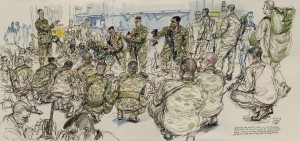50 years ago today, after leading a march for Memphis sanitation workers, Dr. Martin Luther King Jr. was tired and not feeling well and as a result, had asked to be excused from speaking at the Mason Temple that night.
He asked his friend Ralph Abernathy to speak instead, but Abernathy felt that they needed to hear from Dr. King as well. So Abernathy fired up the crowd which also fired up Dr. King.
Looking back now, we know that this would be Dr. King's final speech. On the evening of April 4, 1968, as he stepped out onto the balcony of the Lorraine Motel in Memphis on his way out to dinner, he was fatally shot by James Earl Ray.
Thinking back to his final speech the night before, it almost seems that he knew what lay ahead.
“Well, I don't know what will happen now. We've got some difficult days ahead. But it really doesn't matter with me now, because I've been to the mountaintop. And I don't mind. Like anybody, I would like to live - a long life; longevity has its place. But I'm not concerned about that now. I just want to do God's will. And He's allowed me to go up to the mountain. And I've looked over. And I've seen the Promised Land. I may not get there with you. But I want you to know tonight, that we, as a people, will get to the Promised Land. So I'm happy, tonight. I'm not worried about anything. I'm not fearing any man. Mine eyes have seen the glory of the coming of the Lord,” Dr. King said in his mountaintop speech on April 3, 1968.
But this wasn’t the only time Dr. King alluded to the possibility that taking a stand and being the public voice for civil rights might cost him his life. He had endured constant death threats towards he and his family and friends from the beginning of his public ministry. He knew what he was up against. This is what he signed up for when he became a follower of Jesus of Nazareth.
On December 5, 1955 (just 4 days after Rosa Parks was arrested for refusing to give up her seat on a Montgomery city bus) Dr. King delivered one of his first major speeches to kick off the Montgomery bus boycott. Near the end of that speech he said this:
“But just before leaving I want to say this. I want to urge you. You have voted [for this boycott], and you have done it with a great deal of enthusiasm, and I want to express my appreciation to you, on behalf of everybody here. Now let us go out to stick together and stay with this thing until the end. Now it means sacrificing, yes, it means sacrificing at points. But there are some things that we've got to learn to sacrifice for. And we've got to come to the point that we are determined not to accept a lot of things that we have been accepting in the past.”
Dr. King's public ministry as the leading voice for civil rights in his time lasted about 12 and a half years. And from the beginning, he acknowledged the challenges and accepted that it would take sacrifice. This is what it means to follow Jesus. This is what it means to be the church. To stand for justice. “Justice is love correcting that which revolts against love.” (Another line from this first speech)
The American Church too often sits on its hands and watches injustice. Not saying anything. Not stirring the pot. Not engaging in the work of Justice, which is the work of love. And what we are seeing today is precisely what Dr. King predicted in his letter from the Birmingham jail.
"If today's church does not recapture the sacrificial spirit of the early church, it will lose its authenticity, forfeit the loyalty of millions, and be dismissed as an irrelevant social club with no meaning for the twentieth century,"
Dr. King wrote in his Letter From Birmingham Jail.
The Church is called to promote love. Justice promotes love. The motive of the church is “the beloved community.” To see “His kingdom come and His will be done on earth...” To participate in and be ambassadors of heaven. That time and place where “the lion will lie down with the Lamb.” Where the oppressed join hands in fellowship and forgiveness with the oppressor.
If the church is at war against these things either directly or by being apathetic and disconnected, then what is it’s purpose?
On this eve of the assassination of Dr. King, I want to challenge the Church to reflect on its purpose in the earth. It’s not easy to “take the narrow way.” It’s not easy to deny your own rights and freedoms so others can have a little more. But it is what defines the Church. And it is what defined the public ministry of Dr. Martin Luther King Jr.
“He defended the cause of the poor and needy... Is this not what it is to know me, declares the Lord.” Jeremiah 22:16













